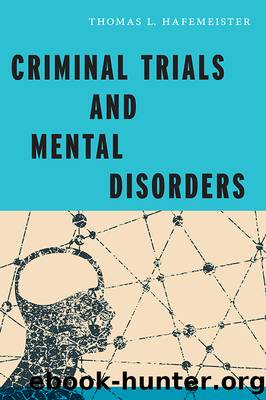Criminal Trials and Mental Disorders by Thomas L. Hafemeister

Author:Thomas L. Hafemeister [Hafemeister, Thomas L.]
Language: eng
Format: epub
Tags: PSY000000 Psychology / General
Publisher: New York University Press
Competence to Waive the Right to Counsel
Criminal defendants have a right to be represented by an attorney under the Sixth and Fourteenth Amendments of the US Constitution. The Sixth Amendment states: “In all criminal prosecutions, the accused shall enjoy the right . . . to have the Assistance of Counsel for his defense.”28 Although this provision gave criminal defendants a right to counsel when facing prosecution in a federal court, it was not until 1963 that the USSC determined that the Fourteenth Amendment extended this right to prosecutions of serious crimes in state courts as well,29 with serious crimes subsequently interpreted to include any crime that could result in incarceration.30 These provisions further ensure that if the defendant cannot afford an attorney, one will be provided for the defendant at government expense.31
At the same time, as with many constitutional rights (although, as discussed, notably not the right to be CST), defendants can waive their right to an attorney and represent themselves in a criminal proceeding (that is, appear pro se), provided they are not unduly disruptive in doing so.32 There are many reasons why defendants sometimes waive their right to counsel and represent themselves. They may not fully understand or appreciate what attorneys do and can accomplish. They may distrust attorneys in general. They may be dissatisfied with their attorney’s performance thus far. They may have an agenda of their own—including a political motive—that they want to pursue at trial, and either their attorney will not cooperate, or they fear their attorney will not cooperate. They may overestimate their ability to represent themselves. They may be paranoid about the legal system and believe, for example, that their attorney is working in cahoots with the prosecution. These various reasons may, however, reflect the impact of a mental disorder.
When defendants express their desire to represent themselves, the question is not whether they will do a good job of representing themselves; arguably, few defendants will do as good a job as an attorney would, and many are likely to do a poor job of representing themselves. The issue for the trial judge to consider is whether the defendant adequately understands the implications of waiving the right to counsel. In other words, is the defendant competent to waive his or her right to counsel? If competent, then defendants are entitled to represent themselves, although the trial judge will often appoint an attorney to be present and “shadow” the proceedings so that defendants who change their mind about self-representation can turn to the attorney for consultation or permit the attorney to take over the reins without the judge having to order a mistrial. In the case of John Mohammad, a.k.a. the Beltway Sniper, the defendant made his own opening statement, which enabled him to express some personal viewpoints he felt it was important to convey, but soon allowed an appointed “shadow” attorney to represent him for the remainder of the trial.33
There have been other well-publicized cases in which a defendant opted for self-representation, but questions were subsequently raised about the defendant’s competence to waive the right to counsel.
Download
This site does not store any files on its server. We only index and link to content provided by other sites. Please contact the content providers to delete copyright contents if any and email us, we'll remove relevant links or contents immediately.
Should I Stay or Should I Go? by Ramani Durvasula(7652)
Why We Sleep: Unlocking the Power of Sleep and Dreams by Matthew Walker(6700)
Fear by Osho(4727)
Flow by Mihaly Csikszentmihalyi(4687)
Rising Strong by Brene Brown(4448)
Why We Sleep by Matthew Walker(4434)
The Hacking of the American Mind by Robert H. Lustig(4375)
How to Change Your Mind by Michael Pollan(4355)
Too Much and Not the Mood by Durga Chew-Bose(4337)
Lost Connections by Johann Hari(4171)
He's Just Not That Into You by Greg Behrendt & Liz Tuccillo(3891)
Evolve Your Brain by Joe Dispenza(3669)
The Courage to Be Disliked by Ichiro Kishimi & Fumitake Koga(3488)
Crazy Is My Superpower by A.J. Mendez Brooks(3398)
In Cold Blood by Truman Capote(3374)
Resisting Happiness by Matthew Kelly(3337)
What If This Were Enough? by Heather Havrilesky(3308)
The Book of Human Emotions by Tiffany Watt Smith(3300)
Descartes' Error by Antonio Damasio(3270)
